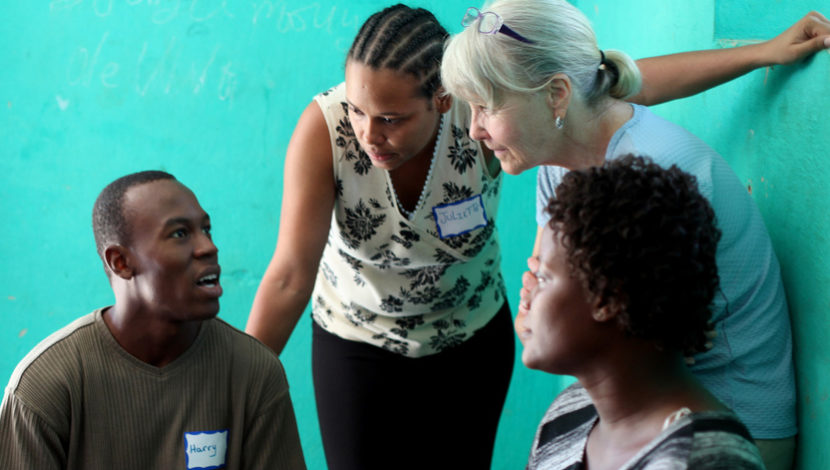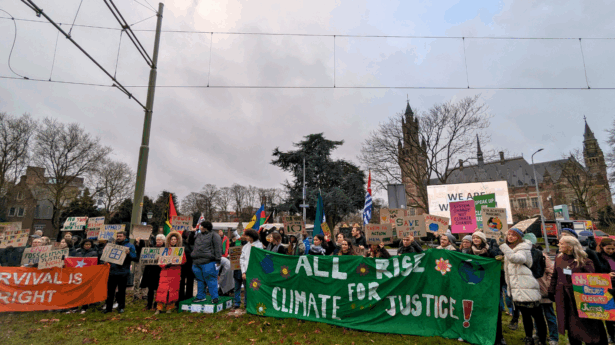The Unitarian Universalist Service Committee advances human rights through grassroots collaborations.
Starting to Live Again

January 16, 2014
Healing trauma after disaster
Originally published in the Winter 2014 issue of Rights Now.
Healing from trauma is a vital component of true recovery from natural and man-made disasters. Yet, mental health services are often overlooked in the aftermath. Since 2009, UUSC has been collaborating with the Trauma Resource Institute (TRI) to make sure that survivors on the margins of society — from Haiti to the Philippines — get the support they need to heal themselves and their communities.
The hidden toll of disaster
After Haiti’s 2010 earthquake, Wendy Flick, manager of UUSC’s Haiti Program, remembers meeting people completely numb and unresponsive. “One of the things that we very frequently see after disasters is a gap in mental health services,” Flick explains. “If people are paralyzed by the trauma of what they’ve experienced, there’s often nowhere for them to go — and, as a result, they’re often not getting other aid and are being blocked from full recovery.”
Flick met a young girl who had fled to the Central Plateau from Port-au-Prince and who was so traumatized that she couldn’t feed herself. “If she hadn’t gotten assistance, she literally would have died of trauma. The people with invisible wounds weren’t getting services.”
Building resiliency
To fill this gap, UUSC brought in TRI to introduce skills for healing trauma. TRI’s Community Resiliency Model (CRM) enables a wide range of people — not just clinicians — to use these skills and to lead others in using them. Plus, because the skills are centered on the body, the model is accessible to people regardless of literacy or education level.
Through skills like “tracking,” “resourcing,” and “grounding,” CRM returns the body’s nervous system to balance. A woman named Philomène told UUSC at the end of a Haiti training session, “After the earthquake my life just stopped, and today I am feeling that I started to live again.”
Elaine Miller-Karas, TRI’s executive director and cofounder, describes CRM’s effects: “In the face of great suffering, tragedy, and horror, the human spirit can be awakened back to resiliency and health and wellness by simply paying attention to the wisdom of the body.”
From model to movement
In Haiti, UUSC and TRI offered a series of train-the-trainers workshops that gave 62 Haitian social workers, teachers, farmers, and other community leaders the tools to train others in these valuable trauma-treatment skills. These workshops, grounded in UUSC’s eye-to-eye partnership approach, were a powerful collaborative experience with survivors.
Miller-Karas underscores this: “People respond in the same way and feel the sensations of well-being and resilience in the same way, but how they look at it through their own culture is very individual. . . . They helped us conceptualize our model better and better and better.” Part of the training process is working with participants to adapt the model and ensure its effectiveness for various groups.
One of the agricultural workers that they trained went on to train 1,500 others. He was delivering limited supplies of livestock in the hills of the Central Plateau, and many people would end up empty-handed. Miller-Karas told the story: “He would use the skills with them, and instead of them being angry, they would go away with smiles on their faces. . . . We learned from the individuals in Haiti that there are new ways to use the skills that I had never even imagined.”
Haiti, Kenya, and beyond
UUSC and TRI used lessons learned in Haiti to develop a CRM trainers program for UUSC partners in Africa. This past summer, Ellen Elgart and Nancy Sokolow, TRI senior faculty members, were in Nairobi with Flick to teach a multicultural group of 15 people from four different countries speaking four different languages.
Despite the challenges this posed, the 10-day intensive training was an unmitigated success. As Elgart put it, “They received the model very, very, very enthusiastically!” Sokolow shared the story of one participant, a doctor from a neighboring country, who brought the skills back to her hospital. The doctor’s coworkers are already reminding each other — and the doctor — to use the skills when hard situations come up.
Elgart explained, “The feedback she was getting from coworkers about using the skills came as a result of her having already trained them in some of those skills. . . . It comes full circle — the students become the teachers, then their students become their teachers.”
Drawing on the success of CRM trainings in Haiti and Africa, UUSC is now working with TRI to bring these trauma resiliency skills to the Philippines in the devastating wake of Typhoon Haiyan.
Self-sufficiency and sovereignty
CRM puts power squarely into the hands of trauma survivors. “People then don’t have to be dependent on an outside entity for their own healing,” Sokolow explains. This is right in line with UUSC’s aim to empower survivors — and not just in the short term. Flick says of CRM: “It’s extremely effective and useful immediately after the trauma of the disaster — but it’s also something that continues to bear fruit as people encounter the traumas of everyday life.”
These trauma resiliency skills have ripple effects far beyond the individual. Elgart traces the connection “from body to resiliency to compassion to hopefully more peace and more justice.” As UUSC is seeing play out in Haiti, people who have the skills to heal themselves from trauma are more likely to connect, to endure the struggles they face, and to effect real change in their communities. This bodes well for all invested in the vision of a world where all people can realize their human rights.
Jessica L. Atcheson is UUSC’s writer and editor.

